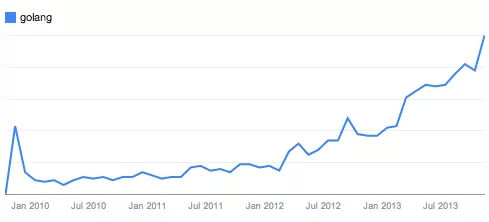| Go Is Four |
| Written by Mike James | |||
| Monday, 11 November 2013 | |||
|
Go has reached the ripe old age of four years old. Is it all grown up yet? Go was announced in November 2009 as as an experimental language that: combines the development speed of working in a dynamic language like Python with the performance and safety of a compiled language like C or C++. Go was originally an in-house project at Google initiated by Rob Pike, Robert Griesemer and Ken Thompson, co-creator with Dennis Ritchie of both Unix and the C programming language. Go is C-like with curly brackets but it has out of the box support for concurrency. The overall view is that having reached version 1.2 (almost) it is mature enough for real use. It even has a few IDEs and plugins for well-known IDEs such as Eclipse and Netbeans. The Go blog has a celebration of Go and when you read it things do seem very positive. For example, there is the rapid growth in Google searches for the term golang:
So ye,s Go is growing in interest and there are even a few well-known open source Go projects - the best known being Docker. However, if you take a look at the TIOBE index of programming languages you won't find Go in the top ten. You have to look at the top 50 where is sits at number 49 in its birthday month's results. Legacy languages such as Fortran, Logo, Prolog and PL/I rank a lot higher. Go did have a moment of glory back in 2009 when, newly issued, it won the language of the year award for the highest rise in ratings. There is no way of avoiding the fact that Go is a minority language, but this doesn't mean that it can't become a mainstream or even an important niche lanaguage. It just isn't there yet. What should Go do to attract more users? Go doesn't have a favored environment - Java has Android, Objective C has iOS, JavaScript has Web Apps - but Go is a general-purpose language that has to go up against Python, Ruby and the others. Go is touted as a better systems programming language, and as such it can expect its users to be reasonably technical, but it still needs to find ways to make it easier for programmers to get started with it. So it needs better installers - there is a new experimental msi installer for Windows; better integration with an IDE and debugger; and; perhaps most important; lots of easy to follow documentation. On which subject you might like to read A Programmer's Guide To Go With LiteIDE.
More InformationRelated ArticlesA Programmer's Guide To Go With LiteIDE Go Programming Language Turns 3 Getting started with Google's Go Why invent a new language? Go creator explains Ready to Go - Go Reaches Version 1 Google App Engine Go-es Forward Go with Google - Yet Another Language!
To be informed about new articles on I Programmer, install the I Programmer Toolbar, subscribe to the RSS feed, follow us on, Twitter, Facebook, Google+ or Linkedin, or sign up for our weekly newsletter.
Comments
or email your comment to: comments@i-programmer.info
|
|||
| Last Updated ( Monday, 24 September 2018 ) |



